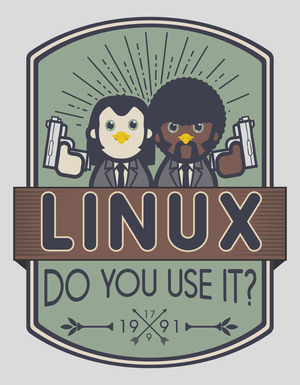I use Windows btw
Except you have to wait 5 seconds before it goes brrrr because of snaps.
Yikes, I forgot about the All-Snap Ubuntu Desktop!
Oh snap
Got my new laptop with Ubuntu, s they offered to install it on it instead of windows. (The license costs of windows was as high as doubling the mem to 64 GB, no contest what so ever) It was on the laptop for a few min (sync install to backup location on NAS) before Debian was installed. When looking around, I just couldn’t get to grips with it. (couldn’t be bothered as well to be honest, as OS replacement was already planned, I just wanted to nick the graphical config)
You can turn them off, but good luck keeping firefox up to date.
Yeah but at this point you’re fighting against the OS, might as well switch to a distro that already works the way you want.
Yea… switching requires work though. I got enough of that already :D
Sure, that’s why I endured Canonical’s BS for almost a year, but when I started my new job I just installed Arch even though Ubuntu was the “safe” choice.
Ah yes, vendor lock-in in desktop linux.
I don’t get why anyone thinks this is acceptable in any way.
I kinda hate it, but I’m also too lazy to switch on my main desktop. Every new install gets Fedora though.
Or just use Waterfox or LibreWolf?
It’s 2 seconds after the latest optimizations.
and apt is awful.
Man, why do people hate apt so much? Maybe because I’m a filthy casual but I never really had any big problems with apt.
Compared to Pacman it’s very slow. I had several problems when I used it. but if it’s good for you, then use it.
If you think apt is slow you’ve never used dnf.
I even forget that it exists sometimes.
Could be because they have more users slowing down the repo servers, especially for debian as it’s used by a huge proportion of docker images, which tends to pull a bunch of packages during the build process eating tons of bandwidth.
maybe you are right.
I mean I prefer Pacman too, but yeah, maybe because I don’t use Ubuntu / Debian that much so I can’t really say.
I like pacman too but I will probably never get comfortable with its arguments. It’s worse than tar which has already become a meme. apt is more intuitive to use.
After a month of using arch, I’m still considering aliases for pacman.
At least I can remember “Xtract Ze Vucking File” for tar, but whenever I want to do anything more than -Syu with pacman, I have to look it up.
deleted by creator
pacman -Syu, pacman -Syyu, pacman -Ss, pacman -Qs, etc. etc…
Right, but if you don’t already know what those arguments mean, then its not exactly super obvious as to what they do.
For example, I’ve been told that you’re generally not supposed to do
pacman -Syyubecause it can result in partial upgrades (unless I’m remembering the wrong set/combination of flags, which would just be case in point…) - I tend to remember flags by associating them with words.For example, the common flags for
tarwas brought up in one of the sibling comments here, but at least I can remember them by:- x: eXtract
- z: Use
gzipfor the operation (which originally I remembered as “the file has .gz” in its extension before I knew whatgzipwas) - v: verbose, giving the details about what its doing
- f: file, the file name you’re wanting to work with
- c: create archive
- t: test archive (I use this with the
vflag to see what is in an archive before extracting it)
But with Pacman, even after using it on and off for a couple of years, I can try to estimate what the flag names are, but have no idea if its right without double checking:
- S: Sync with repositories
- s: No idea on this one
- y: Also no idea on this one
- Q: Query (search)
- u: Allow upgrades (?)
Really I think its the fact that some of the flags can be used in different combinations which have different effects - like passing
ztotardoesn’t change the effect of the flag whether you usexorc. Yet apparently-Syyuand-Syuare valid but one does a proper supported upgrade, and one does a partial upgrade which is not supported and is generally not recommended unless you know what you’re doing. I also know of no occasion where passing the same flag totarmultiple times mutates its behavior as well.That makes it feel like an anti-pattern to me, similar to using magic numbers in programming. Maybe there is a valid reason for this decision (such as why the Linux kernel uses magic numbers in syscalls) but the result is still that it feels incredibly foreign to me, despite having 10 odd years of Linux experience under my belt.
Apt install nala
Correct, apt is awful, apt-get, that’s what you need. ;) You really need to tell apt not to install junk:
$ cat /etc/apt/apt.conf.d/00NoJunk APT::Install-Recommends "0"; APT::Install-Suggests "0";I hate yum with a passion, but still wouldn’t touch dnf when I have an alternative. As it earns my keep (alas, no deb based distro at work… yet), I’ve managed to hide all that perfectly in scripting/config management setups.
What does that config do? Sorry I’m a new Linux user.
When you install software, other packages are pulled in and installed. Some of those are necessary dependencies but some are just recommended (but not actually required). This setting makes apt only install the actual dependencies (no extras).
I see, that’s why sometimes there are lots of installed dependencies that you don’t really remember needing when you use apt.
Ubuntu ain’t what it used to be. If you want a simple distro nowadays just go straight to the source with Debian. There’s no real benefit to going with Ubuntu anymore, and community distros are just a safer bet. Corporate distros aren’t your friend.
I’m very happy with debian. So many applications ship a .deb, and you don’t have to deal with the Canonical bullshit.
Ubuntu go brrrrr.
Yea it sorta just works and has a lot of community support. Imo the easiest of the distros which is not a bad thing. Turn off snaps and it basically is golden. Never needed backups in like 10 years because I know how to fix everything. The only thing that fucks up at this point is Nvidia but same thing has happened to me on Fedora.
You’re mid-curve now. Ubuntu’s better than ever.
Distros based on Ubuntu are better than ever. Ubuntu isn’t the move tho
Oh yeah, Debian is such a poser distro that people only use to sound smart. I brag about how I managed to pull off a full Debian installation all the time. Memes can never, ever under any circumstances end up out of date or anything.
Edit in response to your edit: Canonical has been neglecting the desktop version of Ubuntu for years now. They’ve pulled in some improvements from other distros, so technically it is better, but the only thing they’ve contributed to themselves are snaps, and even that’s just hand-me-downs from server and IoT. The rest of the desktop Linux world has moved on. The things Ubuntu did better than anyone else ten years ago just aren’t special anymore. You can like what you like, but Ubuntu is no longer the undisputed king of straightforward, user-friendly, and low maintenance.
BTW keep in mind this is !linuxmemes@lemmy.world and there’s a certain lightness in the robustness of arguments that goes with it. So on a more serious note, you speak of Ubuntu as having no real benefit over Debian. While I love Debian, using the Ubuntu version of Debian, I get 10 years of security support for free (for up to 5 machines). This is objectively a real benefit for anyone that doesn’t plan to upgrade every two years compared to Debian. You’re right in principle about corporate distros not being your friend, however Canonical isn’t an IBM-owned, publicly traded corporation. Yet.
It may be shocking to you, but I’m actually aware that this isn’t all super serious, and I’m also being light with the robustness of my arguments. Who knew, right? That being said, Debian releases are supported for five years, not two. Ubuntu also releases a new LTS version every two years. I suppose if for some reason you thought it was still a good idea to be on Ubuntu 14.04 that’d technically be a benefit, but the implication of this thread seems to be that we’re talking about desktop distros. That’s certainly what I’ve been talking about. If you’re seriously still running Ubuntu 14.04 on your home computer you’re way more of a niche contrarian edge case than Arch users.
deleted by creator
deleted by creator
Im fighting with you brother
So does debian not have like 4 years old packages anymore in stable or do I have to live in bleeding edge unstable?
There was just a new release, so nothing that old for now, but by the time the next release comes around this one will be getting long in the tooth, no doubt. Debian isn’t for everyone, but if you need the latest version as a native app then you’re not any better off with Ubuntu at this point. Debian is stable and secure and you can use flatpaks, appimages, or even snaps if you’re feeling nasty to get any apps that you really need to be up to date. That’s not what everyone wants, but for those people I’d recommend something like Arch, Fedora, or OpenSUSE, not Ubuntu. Ubuntu has just been neglecting the desktop for a while now, and it shows. They were the best once. Now everyone has passed them.
Debian and Ubuntu LTS are both ~2 year cycles, but Debian has traditionally been better than Ubuntu at picking up security fixes
If you sign up for Ubuntu Pro, they might be as good as Debian, now, but I haven’t checked
If you want faster than that, something other than Debian makes sense
There’s also “testing” in between. It’s not as stable as - well - “stable”, but I didn’t have trouble with it.
What about with a laptop where you can’t disable secure boot? Ubuntu works with it ootb, very few other distros do.
I don’t actually think there is literally no scenario where Ubuntu makes sense, especially if someone else is limiting your options. For the record though, I think Fedora has gotten to be a better Ubuntu then Ubuntu, and it works with secure boot out of the box.
This sort of stuff always makes me wonder…WHAT THE HELL ARE YOU ALL USING YOUR OS FOR?. All I want my OS to do is hold my files, execute my programs and stay the hell out of my way. What could people possibly be doing with their OS that makes version and distro wars worth more than two seconds of your life? Its like arguing about which calculator or plain text editor is best. I dont care. It adds the numbers, it changes the letters, as long as it isnt doing anything else: who cares.
Once you have lived through library dependency hell, you care
How often does that happen to you? Im almost 20 years on Linux full time and it hasnt to me once. I had a wifi driver go out after an update once and Nvida drivers twice. Ive had to roll back a kernal upgrade exactly one time. Those are the only problems and each one took like ten minutes to troubleshoot and fix.
Yeah, if you tend to use your servers for pretty vanilla uses you may not have encountered it much. Once you get into the deep end, it gets deep quick.
Same thing as people arguing about their golf clubs, pointless yes, but distracting…
Most people in the distro wars know it’s pointless and that a tool is a tool, but measuring dicks is as old as humanity and when flipping your dong out wasn’t deemed appropriate anymore, people started arguing about distros
It’s pretty memed on at this point (arch users, gentoo users, NixOS et. al) but I’d make the point - truly without being pedantic - sometimes you just want stuff the way you want them. Should everybody deal with portage on a daily basis? God no. Is it a viable option for folks to keep their build in check and know exactly what’s going on down to their flags/libs? Absolutely. Same reasons with why some folks jive with the AUR.
It’s all about finding use case, just like any piece of tech. Yes there’s dick measuring and all else that comes with that, but there’s a good amount of merit to “I like how this distro revolves around x, it makes sense to me so it’s easier for me to maintain”. If those are some of the things that get Linux on the daily driver aspect, I’m all with it.
as long as it isnt doing anything else: who cares.
That’s a big part of the distro discussion. Ubuntu for example forces snaps down your throat if you don’t pay attention, which usually leads to issues down the line.
Some people are more extreme in that regard and want their system to do absolutely nothing they haven’t explicitly configured. And there’s a distro for everyone.
deleted by creator
That can be nice, but if I actually care about new features in a program Im compiling the RC manually. Otherwise its just more frequent 50GB downloads for some imperceptible incremental change to CUPS and Libre Office.
deleted by creator
Its like arguing about which calculator or plain text editor is best.
it’s obviously emacs
And that’s why I’ve been running Ubuntu on my main machines since 2004.
Uh… software development? Other work stuff?
The less important something is, the more people will argue over it.
See: high school elections, car brands, toilet paper orientation
I just wanted something reliable for gaming that didn’t come with a ton of bloat. I settled on EndeavourOS.
Ubuntu today is pretty trash. I’d replace it with fedora today
Yup, you’re in the middle of the bell curve
No seriously I always install Ubuntu on work machines and they got more breakage in the past couple of years than my arch machine.
You’re in the middle of the 2000s.
deleted by creator
it doesn’t change fedora
Would be true if canonical didn’t screw up so much lately. Fedora is the go to for many now
Why not any other Debian based
Debian based? So just Debian then
Debian IS based 😉
That was what I was going for
… on Debian.
Yea also, or Mint (debian version) or something else
PopOS good Ubuntu bad
For now. Let’s wait a while and see if system76 fucks it up.
probably off topic but temple OS is definitely the best OS in the universe
I think that TempleOS belongs to the furthest right of the bell curve. Needs hyper brain to run, understand and appreciate.
Eh, I’ve been around the block at this point. Fedora ftw. Simple, easy, GUI installer, “just works”™️, sane package manager, normie default DEs, stable, corporate backing. Maybe not for a purist or enthusiast, but I don’t have time for that stuff anymore anyways. My days of pouring hours into getting my Arch install just right are long past me. That was for when I still had free time.
deleted by creator
China spyware distro best distro
Install openKylin now
glory to the CPP, I love Winnie the Pooh
Red Star OS. North Korea best linux.
I am and always will be the left Ubuntu user
This is the final form of the Linux user. Returning to a popular stable distro.
This is honestly a timeline for me instead. Started out with Ubuntu, Debian, Elementary, Peppermint; then did Kali for a while for work, then moved on to Antergos, Arch. I eventually got tired of my system breaking every few weeks, and now settled with Mint for the time being because I don’t have the time to maintain a bleeding-edge distro and I just need something that works when I turn it on.
Similar case. Been rocking Kubuntu for +4 years now. Uninstalled snap and happy as a clam.
Agree. Mint is the new Just Werks distro.
Arch is good for a machine that gets used a lot, but for something where you need stability or to be able to run it for a long time between restarts and updates, something Debian-based is preferable. Just not modern Ubuntu because Snaps are performance-sapping nightmares.
But with Arch you have to pay attention whenever you update or else you brick your whole system. Ask me how I know.
I’ve decided it’s not worth my time trying to figure it out. I just use KDE Neon and press the “check for updates” button. Don’t get me wrong - I know my way around a terminal - but honestly it’s just not worth my time anymore. Just give me a thing that works without me needing to think about it.
You represent the meme so well. Eventually checking Arch news for a manual intervention, using pacman properly, and making sure your system is properly maintained on a regular basis can be a bit of a hassle, which is why sooner or later you’ll choose something like KDE Neon or Mint or something similar.
He represents the meme well in the sense that these memes are all made by people who tried to climb up the bell curve but fell back down to the start, and think that’s the same as reaching the end.
He literally says he couldn’t figure it out. That doesn’t make him smarter than people who can figure it out and use Arch with no problem.
He represents the meme well in the sense that these memes are all made by people who tried to climb up the bell curve but fell back down to the start, and think that’s the same as reaching the end.
That’s true, that could be a trap! I mean I’m currently toying around in Arch and so far there’s been no problems at all, but I’m just a casual user and I’d say that I fall left-side to the curve. I’m one of those in the “OS is a bootloader to the browser and maybe other applications” camp. I do feel though that it’s possible that some people may not want to think about maintaining Arch (Arch is just an example obviously), and would rather turn off their brain when it comes to system maintenance and use something like Ubuntu or Fedora or Mint, which is the point of the meme. He said that it’s not worth his time figuring it out, not that he couldn’t figure it out, if that’s worth any distinction.
Another example I can think of is using Vim when you could just use Nano or any generic text editor. I mean I use Vim as well (for pretty much everything), but in the end some people may not want to spend time getting decent at Vim because they don’t feel it’s worth their time, not because they inherently can’t. If he spent some time, he may be able to do it. I’m sure most Linux users can. But it’s just the time and energy that you must expend to get there, and not everybody feels it’s worth it, even technically proficient Linux users.
A more general abstraction of this bell curve principle is sorta like managing depression; the left-side of the curve will say something like exercise, socialising, eating healthy foods, and having life purpose. The middle might say that we need SSRIs, multiple therapy sessions, mindfulness exercises, daily journaling, compassion training etc. But, the right-side of the curve might again say exercise, socialising, eating healthy foods, and having life purpose. A realisation that something is not worth your time is not inherently indicative of the inability to do said something, though I get your point. It’s all good though!
This. I still daily drive arch, and, even though I’ve rarely had any breaking updates, it’s always feels like a gamble. Have to keep a mental note of which critical packages are being updated, just in case I have to rollback the package. Always carrying an install medium with an arch iso when taking my laptop out.
I abandoned ubuntu for that very same experience, found your Ubuntu zen on manjaro instead. Funny how it goes sometimes.
I’ve only used Manjaro a little bit but isn’t it the case the Manjaro holds back updates before rolling them out, thereby messing with stuff if you use the AUR?
My take is they’re a little more cautious than full Arch. Arch will just push stuff because it’s “ready”, Manjaro does at least some testing so I’m not the guinea pig.
I don’t have any issues with AUR stuff though, everything pretty much works out of the box.
Always carrying an install medium with an arch iso when taking my laptop out.
Same. Have to say Ventoy is an amazing tool, my emergency USB stick has 4 distros and Windows, just in case. There is also some Android app that let’s you turn your phone into bootable medium
I didn’t know you could turn a phone into a bootable medium!
As far as I remember it was DriveDroid and required root. I used to have small ISOs on my phone, like Arch, Super Grub2 Disk, GParted
Interesting. Thanks!
How do you roll back packages? Do you use Timeshift or just using pacman?
just
pacman -U /var/cache/pacman/pkg/package-X.Y.Z.tar.xzor install the downgrade script for a better experience. not sure about timeshift, it sounds like a backup tool to me.This is the Arch way, I feel. Timeshift though, if I’m not mistaken, is a system restore tool, which seems pretty useful though I’ve never used it myself.
I toy around with Arch a little bit but sometimes these are the kinds of things that you really don’t want to think about. But the tradeoff is latest packages, of course.
On the flip side, it’s a rolling-release distro, so you don’t have to play a game of “what broke?” whenever you do a major version upgrade or do a clean install to avoid it, because there are no major version updates. And the AUR is pretty much the reason to use Arch outside of being at the cutting edge (which is mainly useful for using brand new hardware that hasn’t got the best support in the more conventional distros yet, like a new laptop).
deleted by creator
That’s why no matter how much we make fun of Windows or MacOS, they both are still “just works OS” for friends/family who might not care / have time about facing issues that Linux users are accustomed to firing up the terminal to solve. Well, it might change someday. We can always hope.
Arch desktop, Debian server has suited me well. Apt seems really slow compared to pacman, but besides that Debian is great.
'buntu looks pretty but doesn’t brr. Mint goes proper BRRR
Right! Should have put Mint.
Mint supremacy!
Ubuntu was good until it went all corporate and scummy. Now I run Endeavor OS(Arch btw)
Fedora ist the best of two worlds.
I used Fedora as my main for over a decade, but now I question the future of Fedora with all the crap IBM is pulling.
Time to go to Linux Mint
Cinnamon doesn’t work properly across multiple monitors. Your task manager thing doesn’t stay in sync. The one that says it works with multiple monitors just… doesn’t.
Plasma hasn’t given me any issues, but Mint doesn’t have a KDE distribution. So I’ve been on KDE Neon.
Let’s go, Plasma vs GNOME vs Cinammon
Plasma best for customisation and/or new Windows users.
GNOME best for macOS migration and/or great out of the box experience.
Cinnamon best when you hate fun and/or yourself.
Sauce: Mint Cinnamon was my first ever distro but I still hate it.
How about XFCE and LXQt?
LXQt is something I would only use on ANCIENT hardware. I mean hardware from a while before 2011. It’s hideous and barely gets updates.
XFCE is a weirder one. It’s very customisable but also doesn’t get updated much. In my experience it provides barely any performance advantages over KDE although it is smoother than GNOME on crap hardware, so there’s that.
I don’t need either and wouldn’t use them unless I did.
Hah, I like macOS but can’t stand current GNOME.
However, I agree with you about Cinnamon. It feels like someone tried to copy Windows using a desktop environment that wasn’t designed to work that way.
I prefer KDE Plasma or MATE (since I did like GNOME 2)
I don’t even use Mint anymore, but Cinnamon is still my favorite DE by far. I guess that means I hate fun? Why can’t you just say you dislike a thing without insulting everyone who does?
I’m being tongue-in-cheek. I personally find Mint boring and dated, and it can be pretty buggy on newer or more complex setups. I don’t actually think that you “hate fun”, it’s my hyperbolic way of saying that Cinnamon isn’t fun to use for me.
Sometimes being literal makes things less fun, too.
deleted by creator
I’m not a big fan of Mint or Cinnamon (or GNOME for that matter), and as someone else mentioned, Mint does not have a KDE spin. Might have to try KDE Neon.
Yeah, I feel that too. I have wanted to try a immutable distro, is nix any good? Are there any better alternatives?
OpenSUSE Tumbleweed
OpenSUSE Tumbleweed
Seems to be an underrated choice. How’s it going so far, using Tumbleweed?
I tried this once, it had some weird default settings when it came to privileges needed to connect to WiFi, printers etc. Normally polkit would be preconfigured on a desktop to let the user do these things without giving the root password but not opensuse for some reason! Maybe things have changed now.
Hopefully! Certain things like WiFi or printers, I feel should work out-of-the-box without manual setup.
I never managed to break it. While all the *buntu distros tended to just fall apart after a while.
Also you can update after 3 months and zypper will happily process the 6800 changed packages.
Finally it has the best KDE out there, so it was a natural choice.
Sounds great! Tumbleweed has always sounded like a stable rolling-release distro, kind of strange that it never got the attention like Arch or Arch-based distros.
The whole OpenSuSE/SuSE community seems to be on the quiet side for some reason. I never really understood why either. It’s one of the old traditional distributions that’s doing a lot of stuff in the background, but nobody ever hears or talks about it. They even have fun songs.
Maybe it’s because it’s based in Europe (although I would have seen that as a bonus point)?
I don’t even know if it’s very common in the enterprise world, I’ve never actually even seen it there, although I’ve seen lots of Redhat. But according to Wikipedia, it’s out there.
I’ve only meddled with openSUSE a little bit but I suspect it’s due to several reasons. Firstly, perhaps the lack of marketing. You hear news about Ubuntu and Fedora and NixOS and stuff, but never really about openSUSE, I think? Maybe they do promotions but I don’t know about them that much. As you said, they do a lot of stuff but in the background. Perhaps they’re really more of a technical distribution, for sysadmins and some users?
They often tend to sell it as a distribution for developers. for some reason. I don’t write much code any more and just use it (tumbleweed) as my main system for general use. I never really noticed it being any different from any other operating system. You just install whatever you need. In my case, I take notes, edit photos, play games from Steam, and do the usual Internet stuff. Mostly what most users do.
deleted by creator
Isn’t Red Hat owned by IBM and Fedora is a community based distro? Or do I have that wrong?
deleted by creator
Cries in rocky linux
Agreed, though users need to set up RPM Fusion and maybe configure DNF a little bit. It’s still pretty great though.
What and what? Sorry I’ve only been using Fedora for years
RPM Fusion is for non-official repos and proprietary media codecs, I believe? Not sure since I only touched Fedora for alittle bit.
10 years Arch and going…
Arch is the best.

























